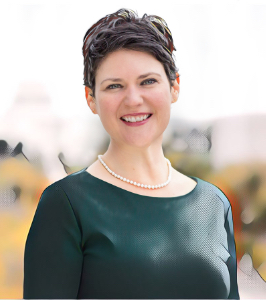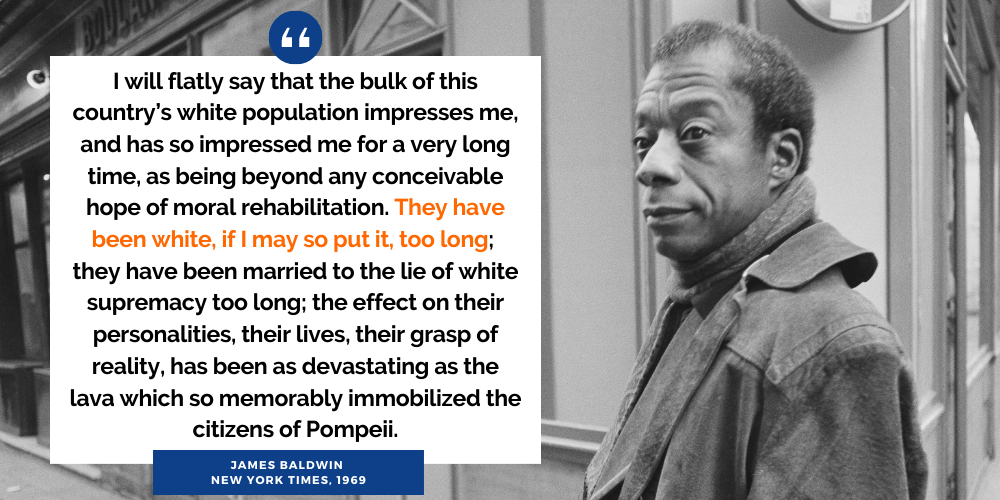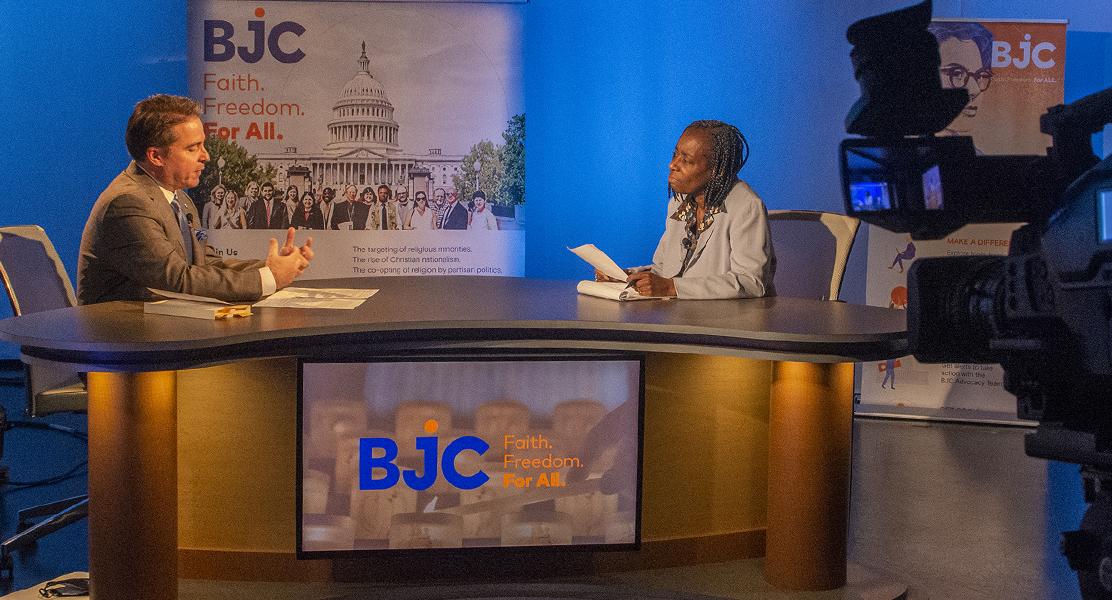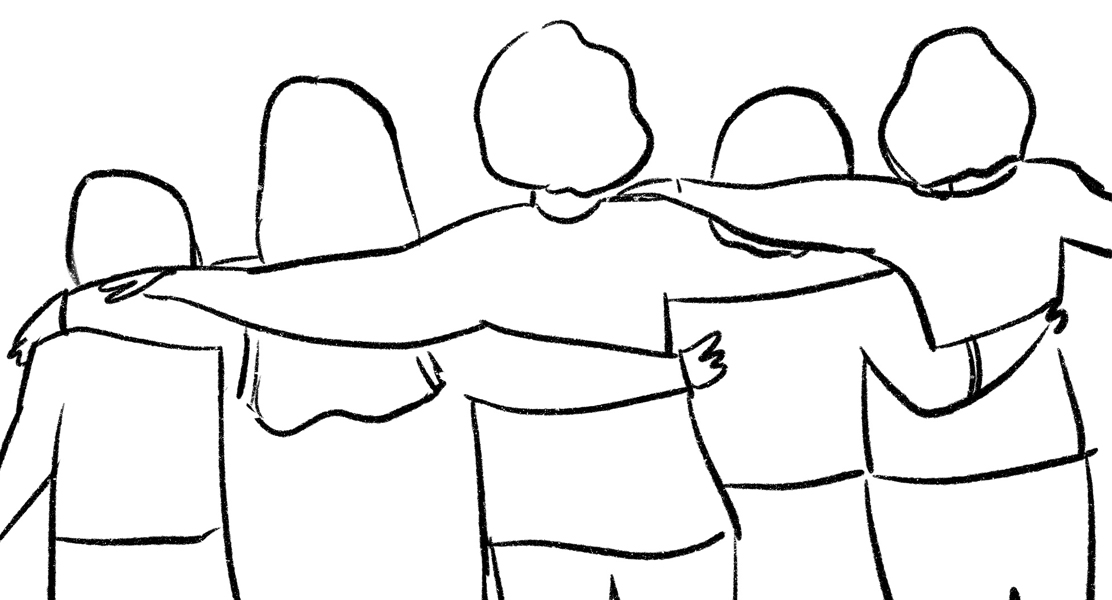Religious Freedom Has Been White Too Long
Before we white people speak, we need to listen. BJC is doing just that this year, as we focus on learning from BIPOC scholars, theologians, preachers, writers, philosophers, poets, prophets and podcasters about faith freedom for all.


James Baldwin assessed the possibility of progress on racial justice in the New York Times in 1969. It was a bleak but realistic diagnosis of the problem: “the bulk of this country’s white population … have been white, if I may so put it, too long.”
At our virtual luncheon event last summer, Robert P. Jones challenged the BJC community to think about how American Christianity has been “white too long.” In his 2020 book, White Too Long: The Legacy of White Supremacy in American Christianity, Jones laid out a convincing and challenging case for the ways that white supremacy has permeated Baptist, Methodist, Episcopalian and many other religious traditions in the United States.
Jones’ book, along with Jemar Tisby’s powerful The Color of Compromise: The Truth About the American Church’s Complicity in Racism, caused me to think about not only the impact that white supremacy has had on American religion but also on how we understand and advocate for religious freedom in this country. I reflected on Baldwin’s remark that we “have been married to the lie of white supremacy too long” and the devastating impact that has had, not just on those who have been oppressed and excluded but on those of us who have profited and benefited from it.
The whiteness I refer to is not about skin tone. It’s about power. The definitions that Tisby gave in our podcast conversation in 2019 are helpful. Racism, Tisby said, is a system of oppression based on race; in other words, racism is prejudice plus power. White supremacy centralizes that expression of power and makes it not only superior but also the “norm,” while everything else is lesser and peripheral.
I’ve seen this white supremacy at work in the histories of religious freedom we advance. We hold up Thomas Helwys, Roger Williams and John Leland as our inspiration. But how often do we talk about Gowan Pamphlet, Frederick Douglass, Martin Luther King Jr., Prathia Hall and Gardner C. Taylor as heroes of faith freedom?
This isn’t just about representation but about valuing the contributions that members of our diverse community offer. I have come to believe that freedom is best understood through the perspective of those who know what it’s like not to be free. We see this truth in the Exodus story, in liberation theology and in the Black Church, as told so beautifully in the recent PBS documentary series. Our ability to advocate for freedom is weakened when we exclude or diminish non-white perspectives.
My reading and learning comes alongside the work of the BJC Board of Directors and staff to take an honest look at BJC’s history. For years, the unquestioned narrative has been that BJC brought together Baptist denominations across racial lines to work together for religious freedom for all.
But our research, which is still ongoing, has revealed that the voices of the people at the table have not all been valued equally. Requests made by Black board members in the 1940s for the organization to speak up for everyone’s freedom and against segregation and discrimination were ignored. Unsurprisingly, Black board members stopped coming to meetings for many years.
This year, BJC’s Committee on Race and Religious Liberty will publicly release a report and make recommendations for reparation. But we need not wait for a final report to take action. We are committed to reimagining our mission to advocate for faith freedom for all with specific attention paid to what we closed our eyes and ears to before: racial injustice.
Before we white people speak, we need to listen. BJC is doing just that this year, as we focus on learning from BIPOC scholars, theologians, preachers, writers, philosophers, poets, prophets and podcasters about faith freedom for all. We are intentionally working to decenter the voices that have taken up almost all of the conversation about religious freedom to this point. We aren’t erasing those voices that have been dominant for so long, but we are making room for everyone to find a home and equal place in our conversations and organization.
Baldwin thought that the American white population was “beyond any conceivable hope of moral rehabilitation.” But rather than grow discouraged or disheartened, I choose to take Baldwin’s words from 1969 as a prophetic wake-up call in 2021.
BJC celebrates our 85th anniversary this year. At our centennial in 2036, what will our community look like? Will our understanding of and advocacy for religious freedom look different than it does today? I certainly hope so. I invite you to join us as we listen, learn, dismantle white supremacy and grow into the inclusive people and organization that God wants us to be.
Amanda Tyler is executive director of BJC. Follow her on Twitter: @AmandaTylerBJC.
This column also appears on BJC’s Medium channel and in the spring 2021 edition of Report from the Capital. You can read the entire magazine as a PDF or as a digital flip-through edition.






